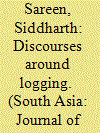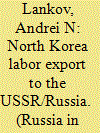| Srl | Item |
| 1 |
ID:
139436


|
|
|
|
|
| Summary/Abstract |
Cambodia has recently demonstrated one of the highest rates of deforestation in the world. While scholars have long explored the drivers of tropical forest loss, the case of Cambodia offers particular insights into the role of the state where transnational governance and regional integration are increasingly the norm. Given the significant role logging rents play in Cambodia's post-conflict state formation, this article explores the contemporary regime and its ongoing codependent relationship with forested land. Insights are distilled from comparative analysis of illicit logging in two ethnographic case studies. Both involve foreign investments by state-owned companies – a Chinese-backed hydropower dam and Vietnamese-owned rubber concessions – and both are nestled in prominent conservation landscapes that are managed with international donor support. Together, the cases reveal how Cambodia's current timber extraction regime works through the use and abuse of legal mechanisms associated with forest conservation and foreign investment projects, and the mobilization of elite alliances that log both for private gain and in service of the ruling party's interests. By implication, the government's remarkable facilitation of transnational projects for conservation and development must be reappraised and ultimately seen as constitutive of a predatory and extractive regime that continues to rely heavily upon illicit logging revenues.
|
|
|
|
|
|
|
|
|
|
|
|
|
|
|
|
| 2 |
ID:
157095


|
|
|
|
|
| Summary/Abstract |
The indigenous Ho people of Jharkhand's West Singhbhum district have long coped with conflict over forests. Despite the importance wood holds for both marginalised and powerful actors, little is known about what determines informal logging locally. This ethnographic study of practices and discourses around logging in a central-eastern Indian forest division examines the views and roles of the actors and institutions involved in wood governance and logging politics. Going beyond tired accounts of state–community conflict and legal–illegal binaries, it addresses how wood extraction is framed locally, and demonstrates how logging is engendered and maintained by a local moral economy.
|
|
|
|
|
|
|
|
|
|
|
|
|
|
|
|
| 3 |
ID:
174879


|
|
|
|
|
| Summary/Abstract |
The export of North Korean labor to Russia began in 1946 and continued, almost uninterrupted, until recently. The arrangements behind this labor migration project underwent dramatic revision from time to time, so we have to speak about three different periods: recruitment of North Koreans for work in fisheries in the 1940s and 1950s, dispatch of heavily controlled logging teams in the 1960s-1990s, and work of North Korean building crews, mainly on an autonomous basis, since the late 1990s. These periods reflect the way relations between the two states have been developing, and the change of their political concerns and interests. However, the underlying rationale has not changed much over the decades: the Soviet/Russian state needed cheap and docile labor, while the DPRK needed an additional source of hard currency and North Koreans were enthusiastic about getting lucrative job opportunities. On balance, both sides have been able to get what they hoped to get, and this has ensured the project’s long life.
|
|
|
|
|
|
|
|
|
|
|
|
|
|
|
|